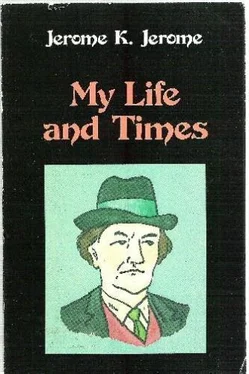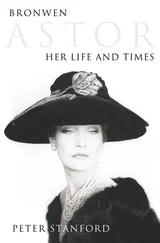Later, I drifted to a solicitor's office. Memoirs of any old family solicitor should make good reading. Almost in every dust-covered, black tin box there lurks a story. Now and again I would open one, re-arrange its contents. Bundles of old faded letters; fly-blown miniatures and photographs. Purchase of Harlowe Manor, together with adjoining lands, April 1832. Draft mortgage. Foreclosed 11.8.'69. Cosgrove v. Cosgrove and Templeton, with note as to custody of children. Ellenby dec d.—provision for Laura and two children secured under separate deed. Crown v. Manningham, with cutting from The Morning Post describing scene in Court. A will enclosing an advertisement for one Munroe George Hargreaves, and across it in red ink “Never discovered.” And so on. Slowly I would close the lid. The shadowed shapes I had unloosed would fade into their hiding-place.
“Ouida” was one of our clients. Once a year, she would leave her beloved Florence to spend a few weeks in London. Her books earned her a good income, but she had no sense of money. In the course of a morning's stroll she would, if in the mood, order a thousand pounds' worth of goods to be sent to her at the Langham Hotel. She never asked the price. She was like a child. Anything that caught her fancy she wanted. Fortunately for herself, she always gave us as a reference. I would have to go round and explain matters. One or two of the less expensive articles we would let her have. She would forget about the others.
I remember having to answer an inquiry as to whether Alfred Harmsworth was likely to prove a desirable tenant for a room in Chancery Lane at thirty pounds a year. My instructions were to reply “guardedly.” But it turned out all right. It was there he started Answers .
We had a client, the Lord Lieutenant of a Welsh county. One day, in Pembroke, he saw a little fisher girl. He took her up on his shoulder and carried her to her home. He arranged with her parents that she should be sent abroad to school; and when she was eighteen he would marry her. The programme was carried out, but it proved an unhappy marriage. He was nearly fifty by then and, as may be guessed, a somewhat eccentric person. He died a few years afterwards, leaving her two thousand a year, provided she never remarried. She was a handsome young woman, and solved the problem by going out to America with a cousin, a young sailor. Only instead of her taking his name, he took hers.
I remember another will case that would have made good drama. The characters were an elderly clerical gentleman who had just come into some property, and a vamp—to use the modern slang. But what made the play remarkable was the lady who played the vamp. She was a woman of over forty, a devoted wife and mother. It was love of her children, I take it, that prompted her. The elder boy was at Oxford, and the younger at Sandhurst. But how to keep them there had long been her difficulty. They met first in our waiting-room, and got into conversation. The progress of the affair I could only guess; though I observed that later on their appointments always happened to coincide, to within half-an-hour or so; and invariably they left together. This had been going on for about a year when, one morning early, a slatternly girl brought a note to the office. My chief had not arrived, and I opened the letter. It was from the old gentleman—a shaky scrawl in pencil, begging someone for God's sake to come at once to an address off the Euston Road. A postscript explained that he was known there by the name of Wilson. I jumped into a cab and was soon there. I found him lying in bed in a comfortably furnished room on the first floor. He was evidently most desperately ill. He could speak only in a whisper.
“She got me last night,” he said, “to sign a will. She had a couple of witnesses outside the door. It leaves her nearly everything. I must have been mad. When I woke this morning she was gone. She has taken it with her.”
I sought to comfort him by the assurance that such a will could easily be set aside—that she would not dare to defend it.
“You don't know her,” he said. “Besides, my wife will sacrifice herself rather than drag my name into the mud. She is reckoning on that.”
“What's the matter with you?” I asked him.
“Heart,” he managed to answer. “She excited me on purpose, I am sure of it. I am dying.”
I told him his only chance was to keep calm. A hansom was the quickest thing in London in those days; but I seemed to be hours getting back to the office. My chief rushed off a four-line will, leaving everything the man possessed to his wife, and expressly cancelling the will made the day before. He was in great pain when we got back, but was just able to sign. And then I went for a doctor. He died in the evening. The lady changed her solicitors. I met her years afterwards, at a reception at the Foreign Office. She remembered me, and was most gracious. She had grown grey, but was still a handsome woman.
All this time I had been writing stories, plays, essays. But it was years before anything came of it.
Chapter IV
MY FIRST BOOK, AND OTHERS
My first book! He stands before me, bound in paper wrapper of a faint pink colour, as though blushing all over for his sins. “On the Stage—and Off. By Jerome K. Jerome” (the K very large, followed by a small j; so that by many the name of the author was taken to be Jerome Kjerome). “The Brief Career of a would-be Actor. One shilling nett. Ye Leadenhall Press. London. 1885.”
He was born in Whitfield Street, Tottenham Court Road, in a second floor back overlooking a burial ground. The house is now a part of Whitfield's Tabernacle. A former tenant of the room—some young clerk like myself, I guessed him to be—had been in love with a girl named Annie. The bed was in a corner, and, lying there, he had covered the soot-grimed wall-paper with poetry to her—of sorts. It meandered in and out among Chinese temples, willow-trees and warriors. One verse I remember ran:
“Oh, Annie fair, beyond compare,
To speak my love I do not dare.
Oh, cruel Fate that shakes her head,
And tells me I'm too poor to wed.”
Being directly opposite the pillow, it greeted me each morning when I opened my eyes. It was applicable to my own case also, and had a depressing effect upon me.
I had tried short stories, essays, satires. One—but one only—a sad thing about a maiden who had given her life for love and been turned into a water-fall, and over the writing of which I had nearly broken my heart, had been accepted by a paper called The Lamp . It died soon afterwards. The others, with appalling monotony, had been returned to me again and again: sometimes with the Editor's compliments and thanks, and sometimes without: sometimes returned with indecent haste, seemingly by the next post; sometimes kept for months—in a dustbin, judging from appearances. My heart would turn to lead whenever the dismal little slavey would knock at the door and enter with them. If she smiled as she handed me the packet, her thumb and finger covered with her apron so as not to soil it, I fancied she was jeering at me. If she looked sad, as more often she did, poor little overworked slut, I thought she was pitying me. I shunned the postman when I saw him in the street, feeling sure he knew my shame. I wonder if the smart journalists who make fun in the comic papers of the rejected contributor have ever been themselves through that torture-chamber.
By luck, my favorite poet, just then, was Longfellow. It has become the fashion to belittle him. Perhaps all his verse does not reach the level of, say, “The Building of the Ship.” But even Wordsworth nods. To youth, face to face with giants, he will long remain a helpful voice. Some two years before, on a sudden impulse, I had written him a long rigmarole of a letter, pouring out my troubles to him, addressing it simply to Henry Wadsworth Longfellow, America; and had received an answer proving to me that he understood my case exactly and knew all about me. Always when things were at their worst, or nearly so, I would go to him for comfort; and one evening, crouching over my small fire, I struck the poem beginning:
Читать дальше










